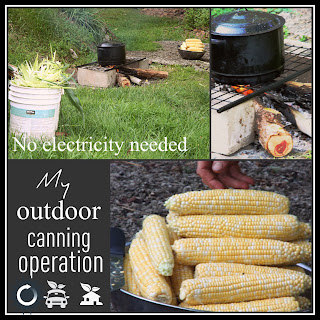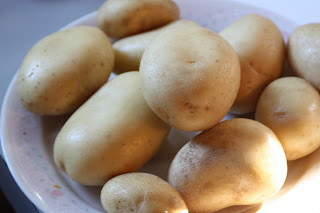 A few years ago, we tried Principe Borghese, an Italian drying tomato. We have been happy with it. They can be rehydrated in boiling hot water, then drained and seasoned with olive oil, salt and herbs. It is the red tomato in the photo. We also tried drying the orange cherry-type tomato, called Sunsugar. The Sunsugar is the sweetest of our tomatoes. These are delicious, kind of like a tomato raisin.
A few years ago, we tried Principe Borghese, an Italian drying tomato. We have been happy with it. They can be rehydrated in boiling hot water, then drained and seasoned with olive oil, salt and herbs. It is the red tomato in the photo. We also tried drying the orange cherry-type tomato, called Sunsugar. The Sunsugar is the sweetest of our tomatoes. These are delicious, kind of like a tomato raisin.
 My wild rice plants have taken off and are now in bloom. Some of the stalks are as high as 9 feet. The female flowers are on the top half of the inflorescence. The male flowers are on the lower half. I wonder how the pollen gets up top to pollinate it! God's design functions perfectly, even if I can't understand how. The wild rice grows well in this mucky pond environment. The microbes that feed it are doing a wonderful job.
My wild rice plants have taken off and are now in bloom. Some of the stalks are as high as 9 feet. The female flowers are on the top half of the inflorescence. The male flowers are on the lower half. I wonder how the pollen gets up top to pollinate it! God's design functions perfectly, even if I can't understand how. The wild rice grows well in this mucky pond environment. The microbes that feed it are doing a wonderful job.
 These peaches are from my trees. They have bacterial spot. Peach growers use sprays to keep this blemish off of their peaches. Most people would not eat a peach that looks like this, or at best they would cut this area away. Yet, the flesh under the spotted area is much sweeter than the side of the peach without the spots. I have measured 15 brix under the spotted area and 12 1/2 brix under the area that look "supermarket clean". Why the peaches are sweeter in the area that has bacterial spot, I don't know. But I remember an organic orange grower in Florida telling me that oranges that have rust on the skin (a blemish of oranges), were sweeter than the unblemished oranges. If anyone knows why these blemishes cause the fruit to be sweeter, let me know.
These peaches are from my trees. They have bacterial spot. Peach growers use sprays to keep this blemish off of their peaches. Most people would not eat a peach that looks like this, or at best they would cut this area away. Yet, the flesh under the spotted area is much sweeter than the side of the peach without the spots. I have measured 15 brix under the spotted area and 12 1/2 brix under the area that look "supermarket clean". Why the peaches are sweeter in the area that has bacterial spot, I don't know. But I remember an organic orange grower in Florida telling me that oranges that have rust on the skin (a blemish of oranges), were sweeter than the unblemished oranges. If anyone knows why these blemishes cause the fruit to be sweeter, let me know.
 I was impressed to set up a canning operation outdoors. I was surprised to find that I could bring my canning pot to a boil faster than on the electric stove! My family used to do canning this way when I was a boy. I also cook my corn in a kettle outdoors, in preparation for freezing it. And I cooked my apples this way, for applesauce. It sure keeps the house cooler, when it's 87 degrees in the shade outside! And saves $ on our outrageous CT electric bill! We have really high rates here.
I was impressed to set up a canning operation outdoors. I was surprised to find that I could bring my canning pot to a boil faster than on the electric stove! My family used to do canning this way when I was a boy. I also cook my corn in a kettle outdoors, in preparation for freezing it. And I cooked my apples this way, for applesauce. It sure keeps the house cooler, when it's 87 degrees in the shade outside! And saves $ on our outrageous CT electric bill! We have really high rates here.
God designed that man and animals should both be fed. When my early peaches ripen, the birds damage most of them. When the later peaches ripen, the wild black cherries are ripe. And the birds don't peck at my peaches, because they prefer the cherries. The later varieties of peaches are richer tasting. I am shifting toward growing later varieties. I have saved a 500 foot line of wild cherries, just for the birds! Another benefit of having the black cherries is that they keep the racoons out of my grapes, since racoons also prefer cherries over grapes.
 God designed potatoes to have a certain amount of nutrition. When they are full of nutrition, they look perfectly smooth like in the photo. There are no indentations where the eyes are. Sunken eyes are a symptom of nutrient deficiencies. Potatoes like alot of organic matter, especially decomposed leaves and sawdust. We built the ground up by putting down 1 foot of leaves and 4-6 inches of horse barn sawdust bedding. After 2 years of rotting, I slipped these potatoes under this organic matter and mulched the surface with leaves to keep the weeds down and conserve moisture. These potatoes are from one plant that I dug out with my bare hands. If potatoes are planted in the environment which God designed them to grow in, they will taste delicious if the variety still has the ability to take up the nutrients in the soil. Some varieties cannot take up the nutrients, even if present in the soil. These varieties have been bred to grow on chemical fertilizers. They do poorly on rich organic soil without the chemical fertilizers added.
God designed potatoes to have a certain amount of nutrition. When they are full of nutrition, they look perfectly smooth like in the photo. There are no indentations where the eyes are. Sunken eyes are a symptom of nutrient deficiencies. Potatoes like alot of organic matter, especially decomposed leaves and sawdust. We built the ground up by putting down 1 foot of leaves and 4-6 inches of horse barn sawdust bedding. After 2 years of rotting, I slipped these potatoes under this organic matter and mulched the surface with leaves to keep the weeds down and conserve moisture. These potatoes are from one plant that I dug out with my bare hands. If potatoes are planted in the environment which God designed them to grow in, they will taste delicious if the variety still has the ability to take up the nutrients in the soil. Some varieties cannot take up the nutrients, even if present in the soil. These varieties have been bred to grow on chemical fertilizers. They do poorly on rich organic soil without the chemical fertilizers added.
